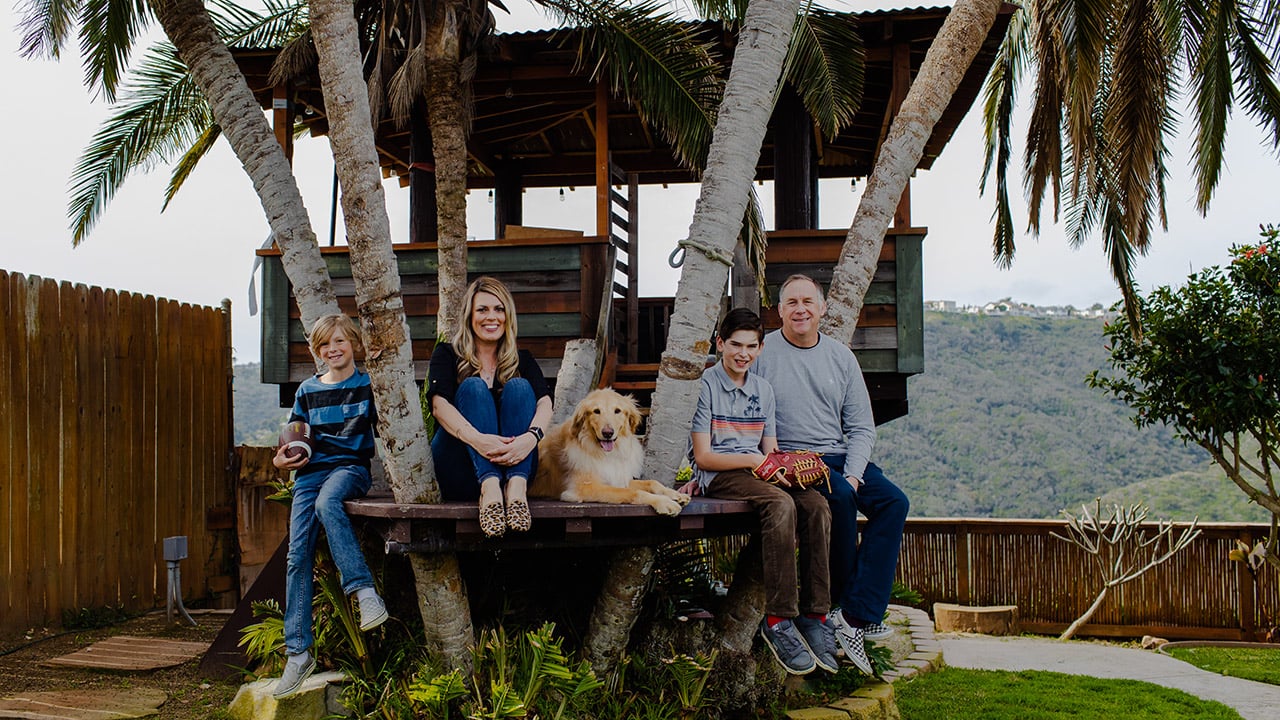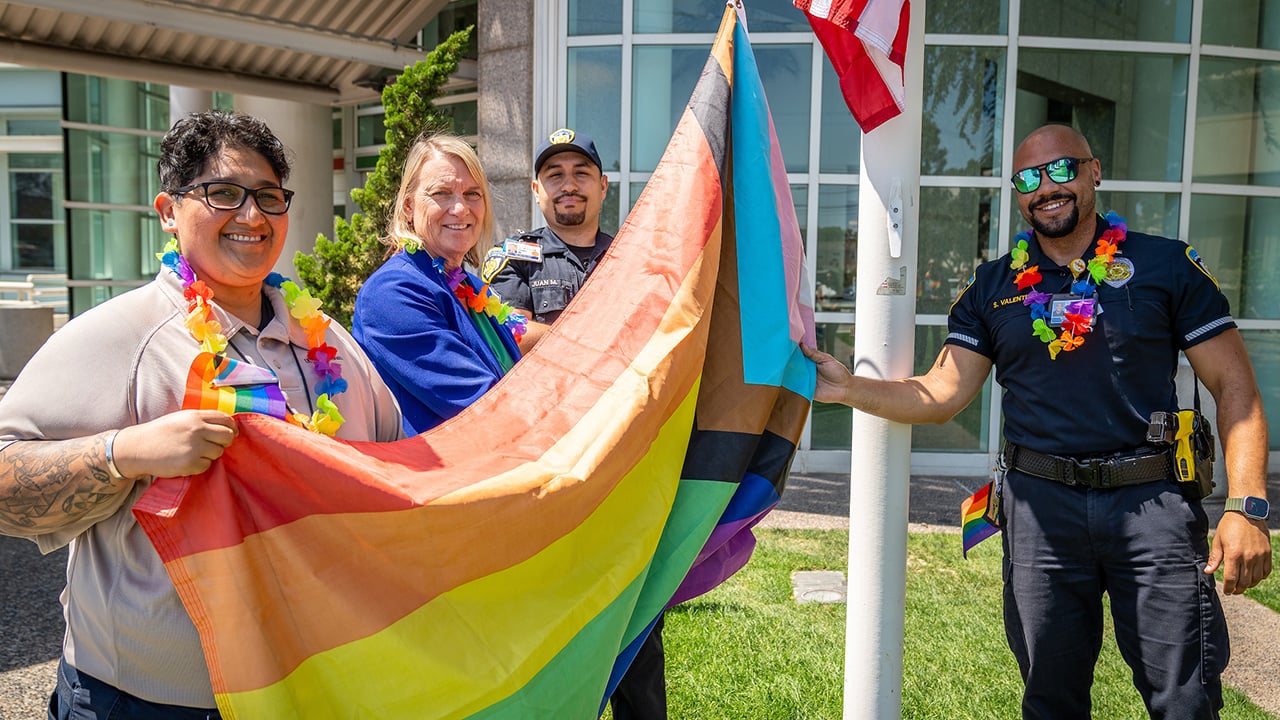
Alison Moore, MD, MPH, recently celebrated being named president-elect of the American Geriatrics Society with an honorary first pitch during Doctor’s Day at a recent San Diego Padres game. Photo credit: Alex Matthews, UC San Diego Health
When Alison Moore, MD, MPH, stepped out onto the San Diego Padres’ field at Petco Park recently to throw out the honorary first pitch on Doctors’ Day, she was overcome with admiration for her own field: geriatrics.
Her passion for caring for older adults is what prompted this recognition on the baseball field, having recently garnered the prestigious honor of being named president-elect of the American Geriatrics Society (AGS). AGS is the leading organization for geriatrics professionals with more than 6,000 members dedicated to enhancing the health, independence and quality of life of older adults.
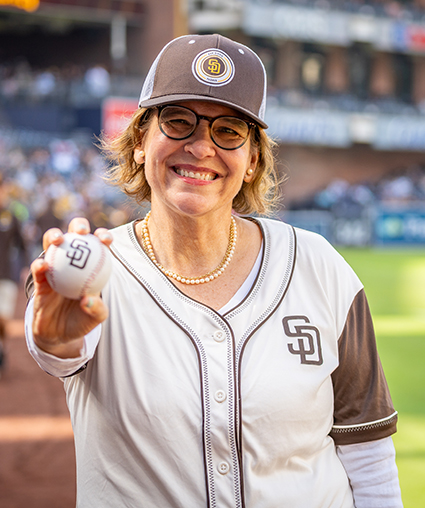 Throwing an honorary pitch on the field at Petco Park was an opportunity to highlight Moore’s own field of geriatrics. Photo credit: Alex Matthews, UC San Diego Health
Throwing an honorary pitch on the field at Petco Park was an opportunity to highlight Moore’s own field of geriatrics. Photo credit: Alex Matthews, UC San Diego Health
"To me, geriatrics is the happiest field because every person we see has made it to older age. They have lived through a lot and are grateful to be listened to and cared for," said Moore, chief of the Division of Geriatrics, Gerontology and Palliative Care at the University of California San Diego School of Medicine, and geriatrician at UC San Diego Health. "So, to get to throw out a pitch at the Padres game in honor of my field of geriatrics, it was a once-in-a-lifetime experience — and certainly the most famous I will ever be."
Age-appropriate care has never been more important, Moore said. Currently, there are more than 46 million Americans aged 65 and older, and that number is projected to double to more than 98 million by 2060, according to the U.S. Census Bureau. Older patients can have complex health needs, making specialized medical care crucial.
"As geriatricians, we understand how health systems work and have vast knowledge of the places where older adults get care and live — from ambulatory care to assisted living and memory care to nursing homes. That allows us to be judicious about how care is delivered, how we can help older adults ease into transitions, avoid hospital readmission and provide care where they want it to be provided — which is typically at home," said Moore, noting that her 94-year-old father takes great pride in his ongoing independence.
Moore is also a leading researcher who has specialized in substance use including alcohol and cannabis use, among other topics, in older adults. She has been widely interviewed by major news outlets including the New York Times and the Washington Post about topics ranging from the keys to longevity and rising emergency department admissions among seniors using cannabis to what happens to your brain when you retire and the importance of sleep as we age.
In this Q&A she reflects on a career steeped in improving the lives of older adults, offering insight into age-specific health issues, the importance of continued National Institutes of Health (NIH) research funding and her vision for her new role as president-elect of AGS.
 Moore said she finds great fulfillment in caring for older adults, including her patient Irving Tragen, pictured here. Photo courtesy of Moore
Moore said she finds great fulfillment in caring for older adults, including her patient Irving Tragen, pictured here. Photo courtesy of Moore
What sparked your interest in geriatrics and what are some key advancements that have defined your field during your tenure?
As is common among geriatricians, I have always been drawn to older adults. At family parties, I would gravitate to grandparents and other older relatives. In residency, I particularly enjoyed caring for older adults and having conversations about end of life. As a geriatrics fellow, I knew I had made the right career choice as I loved the complexity of aging and the interdisciplinary approach to caring for older adults.
There have been many advancements in geriatrics including a better understanding of cognitive health, specifically, dementia and delirium. We are also seeing a greater appreciation and demand for geriatrics heath care professionals. Holistic care models and approaches such as the Hospital Elder Life Program (HELP) to address delirium and Guiding on Improved Dementia Experience (GUIDE), a program to address dementia, have been developed, tested and disseminated widely. The 4Ms Model for Creating Age-Friendly Health Systems was developed to help health systems improve care for older adults by focusing on Medications, Mind, Mobility and what Matters.
As a nationally recognized physician, scientist and educator, what is your best advice for these common health issues as we age?
- On sleep: Sleep changes with age, and it can become more challenging to get good sleep. It’s important to understand what triggers may be impacting your sleep — maybe it’s pain, maybe too much daytime sleeping is making it hard to fall asleep at night, or perhaps having to use the bathroom makes it difficult to return to sleep. It is important to identify what other factors may be impacting your sleep instead of reaching for sleeping pills, which can have their own negative consequences.
- On physical and mental activity: It’s increasingly recognized that it’s "use it or lose it" when it comes to physical and cognitive ability. As we age our muscles weaken, so improving your strength, balance and flexibility through whatever type of exercise you can do safely is important. Keeping your mind active and engaged is also key, and reading, learning new skills and having engaging conversations can boost mental strength.
- On fall prevention: Certain medications can increase your risk for falls, so check to see if your medications are contributing to feeling off-balance. Make sure your vision and hearing are optimized because they both impact balance and how you move in the world. Use assistive devices like a cane or walker if you need them. Wear proper footwear and do a home safety check for poor lighting and things like throw rugs and electrical cords, which can be tripping hazards.
- On retirement: Think about what you want to do during retirement long before you retire — this will set you up for success. Maybe it’s a combination of volunteer work that has meaning for you, mentoring younger people who are following a similar career path, traveling to national parks with old friends, becoming a master gardener, spending more time with the grandchildren, getting to the pool to swim regularly or learning more about using artificial intelligence (AI). Being open to new experiences before you make a big life change can help prepare and inspire you.
What is your vision as president-elect of AGS, and how does the organization advance health care for older adults?
As president-elect, I am committed to advancing our core mission of improving the health, independence and quality of life for all older people. I look forward to working with AGS members on our vision, which includes:
- Having access to high-quality, person-centered care informed by geriatrics principles and free of ageism.
- Being supported by and able to contribute to communities where bias and discrimination no longer impact health care access, quality and outcomes for older adults and their caregivers.
We will do this through our work in guiding policy, supporting new innovations in clinical care, education and research, and continuing to increase the number of health care professionals who provide outstanding care to older adults.
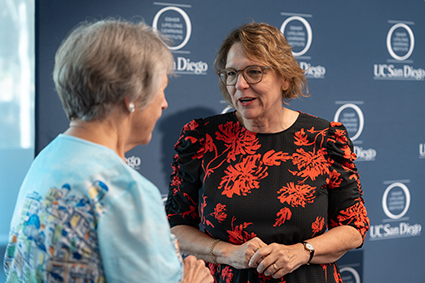 After giving a lecture recently at the Stein Institute for Research on Aging at UC San Diego, Alison Moore, MD, MPH, answered audience questions. Photo credit: Kyle Dykes, UC San Diego
After giving a lecture recently at the Stein Institute for Research on Aging at UC San Diego, Alison Moore, MD, MPH, answered audience questions. Photo credit: Kyle Dykes, UC San Diego
Much of your research has focused on substance use in older adults — what has driven your work in this important area, and how are findings being used in patient care?
Alcohol and cannabis use among older adults have been vastly understudied — so it has been an opportunity to apply a geriatrics lens to their use. The bulk of my research career has been on alcohol and aging, and then with the recent surge in cannabis use in older adults, it became clear that a growing number of older adults are experimenting with alcohol and cannabis to ease chronic symptoms.
A 2020 study we did on cannabis use in our geriatrics clinic was eye-opening when we learned that more than half of the participants were new users of cannabis. With cannabis, it’s like the wild west because most people have no clue how potent it can be; today’s cannabis is different than what they may have tried earlier in life, yet older adults may seek an alternative to prescriptions for treatment of pain or insomnia. Substance use research in older adults is crucial, as with age, things get more complicated, and we need to know more to advise them about what amounts and types of substances are unsafe and, for cannabis, what might be possibly helpful.
What could potential NIH cuts mean for aging research and the care of older adults?
These actions could significantly impact the future of our research, limiting our ability to drive scientific discoveries and improve health and quality of life for older adults and those who are seriously ill. We could see reduced funding for clinical trials of interventions to treat conditions like heart and lung disease, osteoarthritis and Alzheimer’s disease. The loss of our research infrastructure and reduced ability to conduct research will reduce innovation and could impact an entire generation of scientists working on leading-edge breakthroughs.
It is important to take action through advocacy and awareness. Contact your local and national representatives to express concerns, join and support advocacy groups and raise awareness through media campaigns, petitions and letter writing.
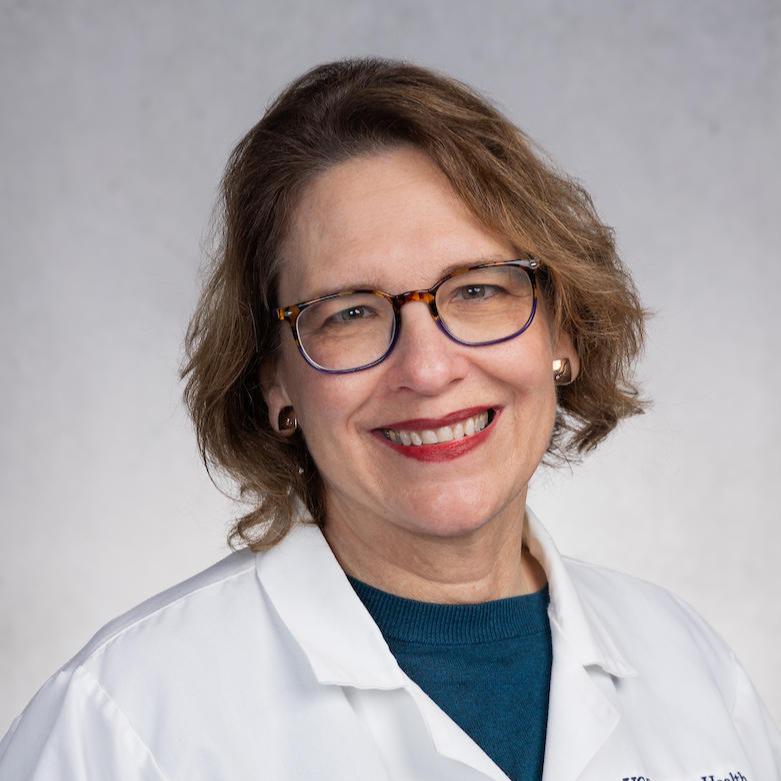
Alison Moore, MD, MPH, FACP
- Primary Care Physician
- Chief, Division of Geriatrics, Department of Medicine
Senior Medicine | Geriatrics
UC San Diego Health geriatricians specialize in keeping older adults healthy.

